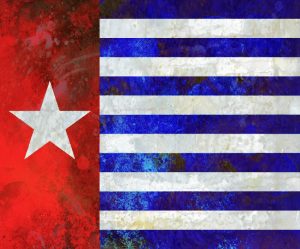Separatist fighters in Indonesia’s Papua region yesterday took a New Zealand pilot hostage after the small commercial plane that he was flying landed in a remote and militarized region of the Papuan highlands.
The New Zealand Herald reported that Captain Philip Merthens was piloting a Susi Air plane carrying five passengers, including an infant, yesterday from Mozes Kilangin Airport in Mimika in Central Papua province to Paro Airport in Nduga in Highland Papua province. Nduga has been an epicenter of the growing Papuan insurgency against the Indonesian state.
Authorities said that the aircraft had been destroyed after landing safely in Nduga, and that they had dispatched police and military personnel to the area to investigate. “We cannot send many personnel there because Nduga is a difficult area to reach. We can only go there by plane,” Papua police spokesperson Ignatius Benny Adi Prabowo told Reuters.
Shortly after the kidnapping, the West Papua National Liberation Army (TPNPB) claimed responsibility. Sebby Sambom, a TPNPB spokesperson, told The Australian newspaper that the group had released all five passengers on board the flight but was holding Merthens and would kill him if its demands were not met.
“We want to convey that we have taken this pilot hostage and brought it to the TPNPB headquarters which is far from the airfield area,” Sambom said, adding that it had been carried out in retaliation for the support provided by Western nations to Indonesia’s security forces. “This pilot is a citizen of New Zealand,” he added. “TPNPB considers New Zealand, Australia, Indonesia, America, Europe, all are responsible.”
He warned police and military not to carry out reprisal sweeps or arrest any civilian in the area. A TPNPB statement cited by Reuters said that Merthens would not be released until the Indonesian government acknowledged the independence of Papua.
Papua has been home to a simmering separatist insurgency since the region was absorbed by Indonesia after what independence activists say was a flawed U.N. referendum in 1969. But the conflict has worsened considerably over the past five years, as the Indonesian state has extended infrastructure and transport links into the heart of highland Papua, prompting more damaging and sophisticated attacks by TPNPB and other pro-independence groups, and further Indonesian military deployments.
The eastern portion of the region in particular has become increasingly militarized since 2018. In November 2020, the regional U.N. Human Rights Office expressed its concern about the “escalating violence” and “the increased risk of renewed tension and violence.” Tens of thousands of civilians have reportedly been displaced in the military’s attempts to quash the rising separatist activities.
The kidnapping – just the second that the TPNPB has taken since its first in 1996 – is the latest sign of a security situation that seems set to come to a head. Based on past precedent, the Indonesian authorities are unlikely to respond to the situation with moderation, nor are the rebels likely to surrender their hostage without a fight. The one hope is that the intervention of the New Zealand government – Prime Minister Chris Hipkins said yesterday that the country’s embassy in Jakarta was looking into the kidnapping – manages to defuse the situation and secure Merthens’ release.
































